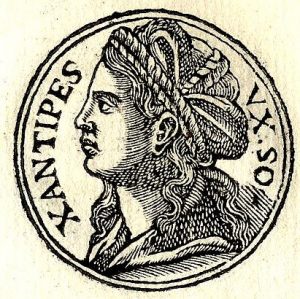Xanthippe was the wife of the ancient Greek philosopher Socrates. She was born around 435 B.C. and was about 35 years younger than her husband. She had three sons with Socrates: Lamprocles, Sophroniscus, and Menexenus.
Xanthippe’s family is thought to be of high status. One reason supporting this is that her eldest son, Lamprocles, was named after her father instead of Socrates’. In ancient Athens, it was a custom that the eldest son was named after the more prominent grandfather.
In Plato’s Phaedo, the philosopher depicts Xanthippe as a dutiful mother and wife. She was also represented in Xenophon’s Memorabilia in much the same way, although in his Symposium, she was depicted as one of the hardest women to agree with. Despite this, it is widely viewed today that she was a quarrelsome and oppressive wife who made Socrates’ life miserable. Socrates did not marry Xanthippe because he was attracted to her beauty or because she was a dedicated mother, but because of her fiery temper. He was believed to have said that he chose her because he knew her argumentative nature would sharpen his philosophical reasoning. Comparing himself to a person who wants to learn to ride a horse, Socrates claims that a person would learn more if he chose to ride an ill-tempered horse rather than a gentle one. If the person learns to manage the wild horse, then it necessarily follows that he could manage all kinds of horses. He said he wanted to mingle with and converse with all sorts of people, and so if he learned to get along with his difficult wife, he said he could get along with anybody.
However, Socrates was not easy to get along with, either, as he was fond of complicating simple conversations. Furthermore, he was known to be frequently out of the house and engaging in philosophical discussions with other Athenians. But Socrates never accepted money from people in exchange for these philosophical investigations. To him, a philosopher should only look after attaining knowledge and truth. As a result, he can be found in Plato’s Apology complaining about having almost no money. If Xanthippe indeed came from a well-to-do family, it is imaginable that Socrates may have depended on the financial support of Xanthippe’s family. To add to all this, Socrates admitted that he loved a man — the young and good-looking general, Alcibiades. In Plato’s Gorgias, Socrates said that he was not only a lover of philosophy but also the lover of Alcibiades, son of Cleinias. In ancient Greece, it was an ordinary matter when two men had a romantic attraction for each other. The Roman author, Aelian, relates that when Alcibiades sent a cake to Socrates, Xanthippe stomped on it repeatedly.
Despite saying he married Xanthippe for her feisty character, Socrates seldom talked back to her. Every time Xanthippe launched a savage verbal attack on him, Socrates walked away meekly and sat on the doorstep. One day, she sent him to the market to buy several things. Upon returning home, Xanthippe discovered that Socrates had forgotten to buy one item. She hurled a brutal verbal attack on him, prompting him to walk slowly to the doorstep. He sat there and comforted himself with deep philosophical thoughts. Then, Xanthippe came out carrying a bucket full of water and poured it on Socrates’ head. Neighbors and passers-by saw what happened and asked Socrates why he did not say anything to his wife. While wiping water from his face, Socrates replied, “This is quite natural. After thunder comes rain.”
